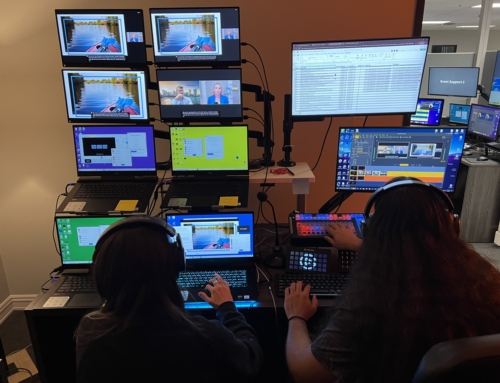As the workforce becomes the work-from-home force, online security and privacy issues have become a more prevalent concern in everyday life. This extends to meetings and conferences that have transitioned from traditional in-person events to virtual meetings. Virtual solutions like Zoom and Vimeo open up possibilities in event design and allow the work-from-home force to stay connected in uncertain times. These programs are also not without their security concerns, and it’s essential to take personal and company-wide steps to protect ourselves. It’s just as necessary to dispel myths when it comes to virtual meetings.
What is Zoom Bombing?
“Zoom Bombing” occurs when a 3rd party enters a virtual meeting and begins to share images and videos without the consent of the host. “Zoom Bombing” is not just something that happens within a Zoom client. Any video conferencing client can potentially face this issue. “Bombing” is not a hack, it is an action taken by the third party to enter into a meeting through a verified link due to a lapse in security management.
What can I do to protect myself, my team, or my attendees?
The first and most important step you can take is to check your security settings, both personal settings for your account and any enterprise accounts you have access to. Limit who can share video and audio, especially if this is for a webinar. Second, do not share unique links with others, even within your own company. Do not advertise your virtual meetings over social media if you have any confidential content being discussed or shared. If you are hosting a virtual meeting, take steps to talk with your virtual production company on security measures to protect attendees. A virtual production company is a great resource and can help you be proactive in securing your meeting.
What steps can I take in my everyday life to protect my privacy?
Understand there is no catchall solution to privacy, and it’s a multi-level process to keep ourselves secure. The most important thing is to get educated. Talk with your partners and experts to understand security and privacy. Don’t leave it up to the IT department. An email requesting that you provide personal information or to go to a 3rd-party website is always suspect, and should not be trusted. Be smart about passwords, and don’t repeat the same passwords for multiple logins! We have to be our own advocates for our privacy.
Like with planning in-person events, there are always going to be security concerns for virtual meetings so these conversations must happen with our coworkers, our partners, and our clients. Armed with this knowledge, we can take the necessary steps to ensure success in our meetings.






